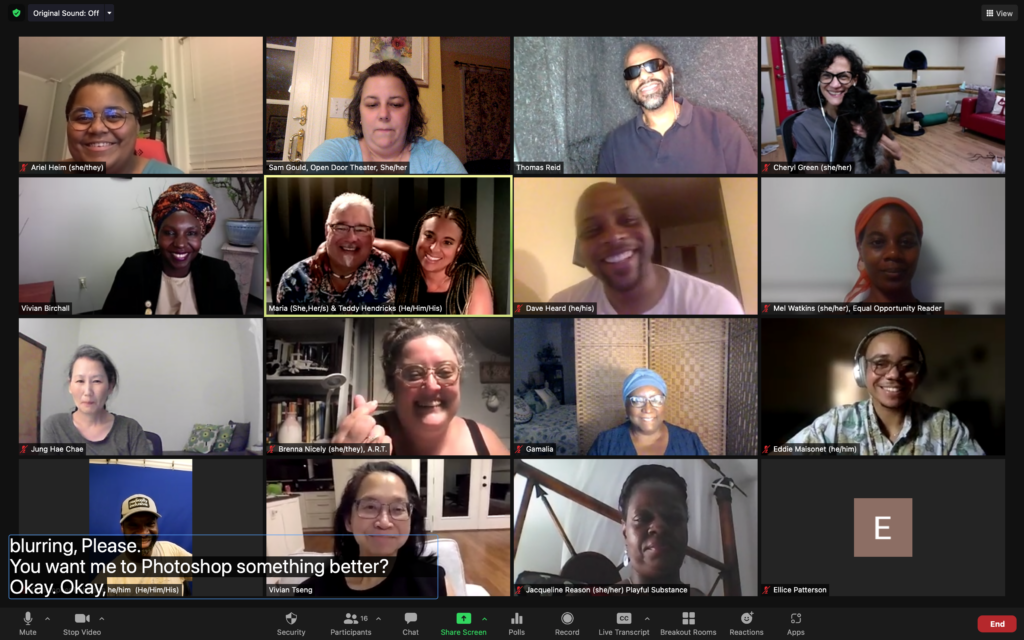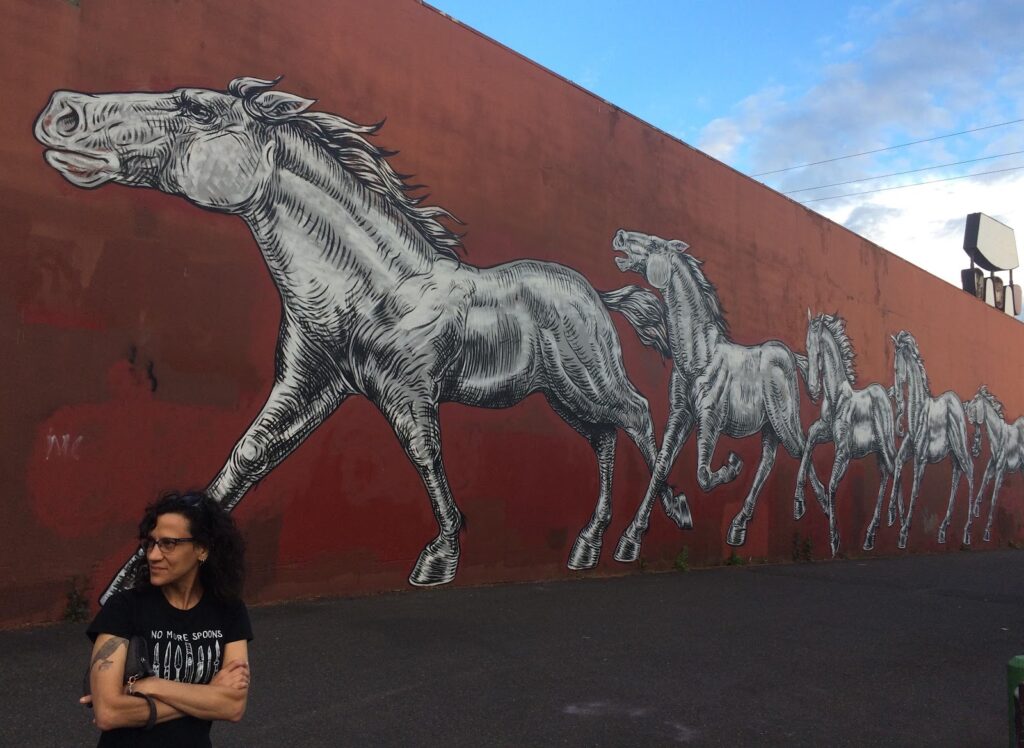Education
VOX is committed to expanding the breadth and scope of accessible programming by training and increasing the capacity of disabled and marginalized artists and experts.
Culturally Responsive Audio Describer Workshop

Through Open Door Theater and in a joint venture with the American Repertory Theater, we ran the first of its kind BIPOC/AAPI Audio Describer Training to increase the pool of Culturally Competent Audio Describers in MA. Currently, the large majority of providers in the field globally are non-disabled, white, and often lack the cultural competency to adequately describe the work of diverse playwrights. We recruited Thomas Reid and Cheryl Green, expert AD trainers and BIPOC/AAPI trainees from the black actor community, the Boston Black Writers Association and the Asian American Playwrights Association, and the local interpreter pool to train them in the art of Culturally Competent Audio Description. Then we facilitated hiring and onboarding our trainees to local arts organizations to train and model new practices in audio description, including the best practice of inclusion of a blind expert consultant on teams, revolutionizing and improving the quality of access in MA.
Applications are open for the next Culturally Responsive AD Training Session scheduled for JANUARY 10, 17, 24, 2024 on ZOOM.
This workshop is intended to be a level one course for Audio Description Candidates to increase the cultural competency of Audio Description for live events in Massachusetts and beyond. It is open to actors, voice actors, writers, and anyone interested in the field of theater, performances and access. Audio Description is a paid access service for live performances. There will be hands-on activities in class and brief at-home exercises in a fun, supportive learning environment. We will touch on the full AD life cycle including writing, narrating, community building, the live theater experience, delivery, and evaluation of Audio Description. Facilitators are Thomas Reid, Audio Description narrator, producer, and Advocate and Cheryl Green, Audio Description writer, narrator, and producer.
Trainees will:
- Learn fundamentals of writing and narrating live theater Audio Description as a creative, subjective practice
- Gain knowledge needed to begin writing and narrating for live theater and leading touch tours with a mentor
- Discuss foundations for building partnerships and audience within blind and low vision community
All session goals will be addressed with an understanding of cultural competency and cultural responsivity built in.
Our project goal is primarily to increase the number of Audio Describers, focusing on BIPOC voices which are often absent, silenced or reframed. We hope individuals not currently working in this field, but who have the skill set and diversity of voice, cultural competency and life experience to contribute greatly to this field to gain income and revenue from this training. We hope to enrich the audience of theater consumers in MA, blind and sighted, by allowing them a wider array of community “voices” describing theatrical performances.
To hear from the first Cohort about their experiences see the YouTube Video.
Meet The Trainers

Thomas Reid
Audio Producer | Voice Over Talent | Audio Description Narrator Consultant & Advocate
Shortly after becoming blind in 2004, Thomas Reid decided to re-ignite a dormant interest in audio production. After years of combining his interest in audio with advocacy, in 2014 he was selected as a New Voice Scholar by the Association of Independence in Radio. During that same year he began his podcast Reid My Mind Radio – featuring compelling people impacted by all degrees of blindness and disability. Occasionally, he shares stories from his own experience as a man adjusting to becoming Blind as an adult.
Thomas has been thinking critically about Audio Description since his early in theater experience in 2007. He’s been covering the topic on the podcast since 2015 and most notably since critiquing various aspects of AD in Marvel’s Black Panther in 2018.
Through his Flipping the Script on Audio Description series, Reid continues to explore the art by going beyond surface level topics and examining its implications on the community.
As an Audio Description Narrator, Reid has appeared on projects for Netflix, Hulu, PBS and more. He provides consultations for independent film makers, film festivals, co-facilitates workshops and serves as moderator or panelist for discussions on audio description and content accessibility.
Cheryl Green
Cheryl Green, MFA, MS is an independent Access Artist with a focus as a captioner, audio describer, and multi-media digital artist. She’s a 2017 AIR New Voices Scholar, 2020 DOC NYC Documentary New Leader, Digital Operations Lead and a Member-Owner at New Day Films, and a member of the Social Audio Description collective. She brings her lived experience with multiple invisible disabilities to creating media that explores politically- and culturally-engaged stories from cross-disability communities. Her audio and written blog, transcribed podcast, and documentary films are at Who Am I To Stop It. She captions and audio describes films for Kinetic Light, Superfest International Disability Film Festival, and Cinema Touching Disability, and leads workshops for artists and museums on arts accessibility.

ASL THEATER TERMINOLOGY GLOSSARY
VOX is currently working on a joint venture with Open Door Theater and Joey Caverly, Acclaimed, Deaf Director/Actor/Artist to create and publish in an open format, Theater specific ASL glossaries for staff training and culture shift, using universal design principles to teach stage managers and backstage crew ASL specifically for use in the wings backstage for silent communication and communication with Deaf actors/staff, basic vocabulary for cuing and additional module including basic front of the house vocabulary to train all ushers, ticket sellers and forward facing volunteers greetings, emergency protocol and basic directions, for ticketing, concessions and restroom wayfinding. We hope to codify some of this language and develop training modules to disseminate to other theater organizations to perhaps innovate backstage communications and front of the house ASL communication standards. Release scheduled for Spring 2024
Director of Artistic Sign Language Training Next Date TBD
Using Broadway touring shows as a frame of reference, accessibility coordinators and arts administrators will get an orientation to current national standards for working with a Director of Artistic Sign Language (DASL) for ASL Interpreted Theatre. Participants will learn how to integrate the important role of DASLs into the tasks of Production Staff, Front of House Staff, Box Office, Marketing Team, and Audience Development/Subscriber Initiatives in order to reduce redundancy and increase the return on investment; examine a customizable “road map” of the DASL process to inform decision-making and mitigate access barriers to common issues through the Anti-ableist and Anti-racist framework; and apply recommended standards of practice for ASL access that align with their production season within discussion groups.
Protactile Training TBD
Protactile is a language used by Deafblind people using tactile channels. Unlike other sign languages, which are heavily reliant on visual information, protactile is oriented towards touch and is practiced on the body. Protactile offers information to the user from the surroundings in a map like orientation, such as crowd reactions and movement.
Canvas AD Cohort Culturally Responsive AD Training Platform Portal